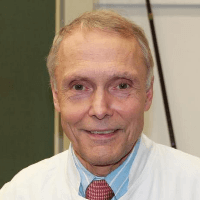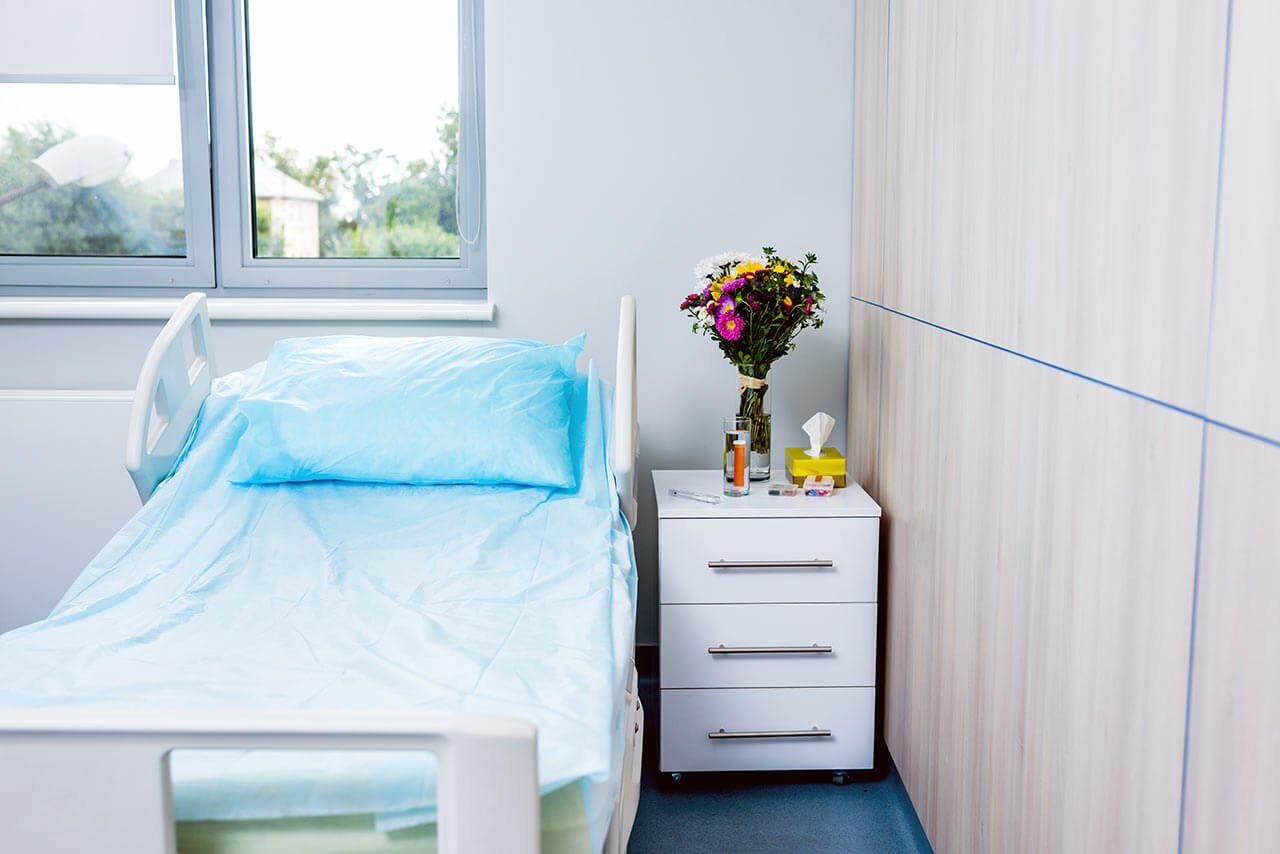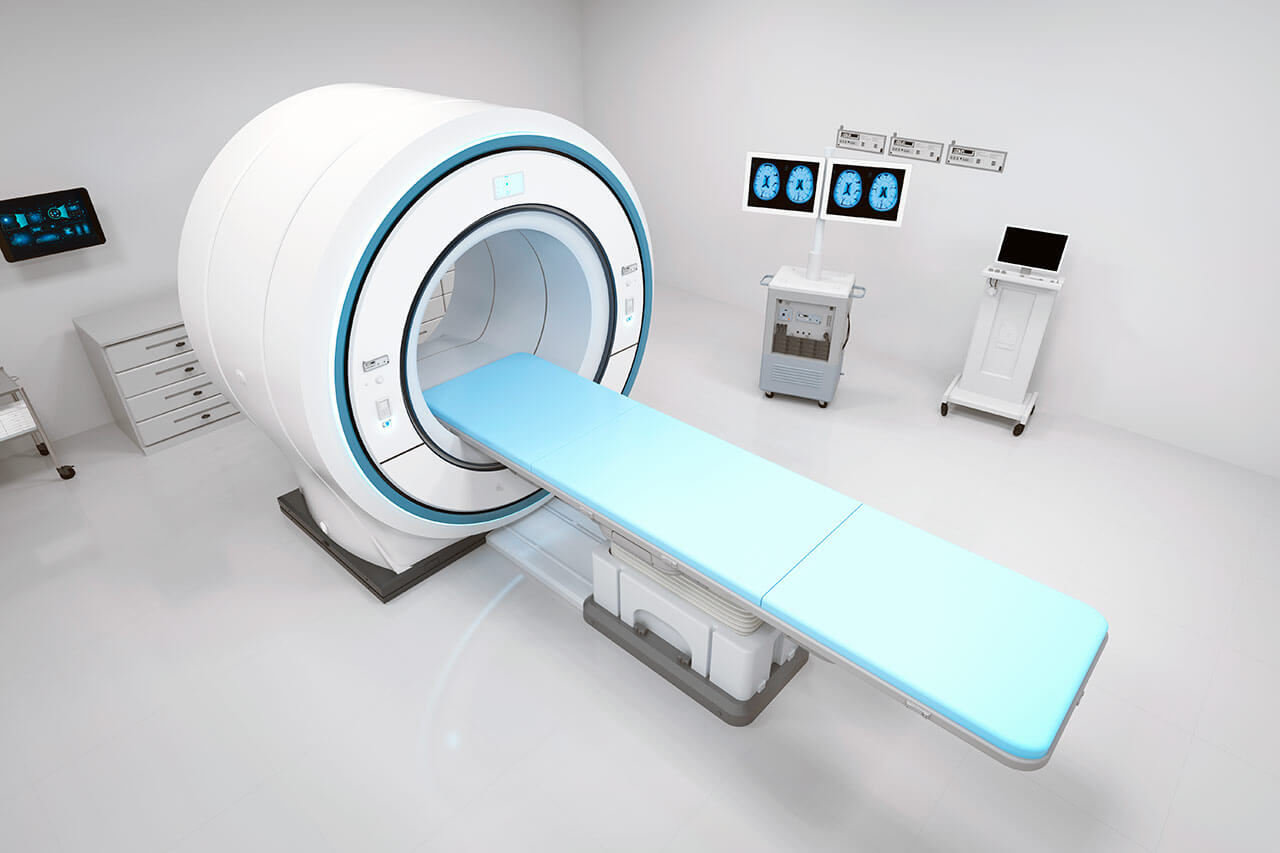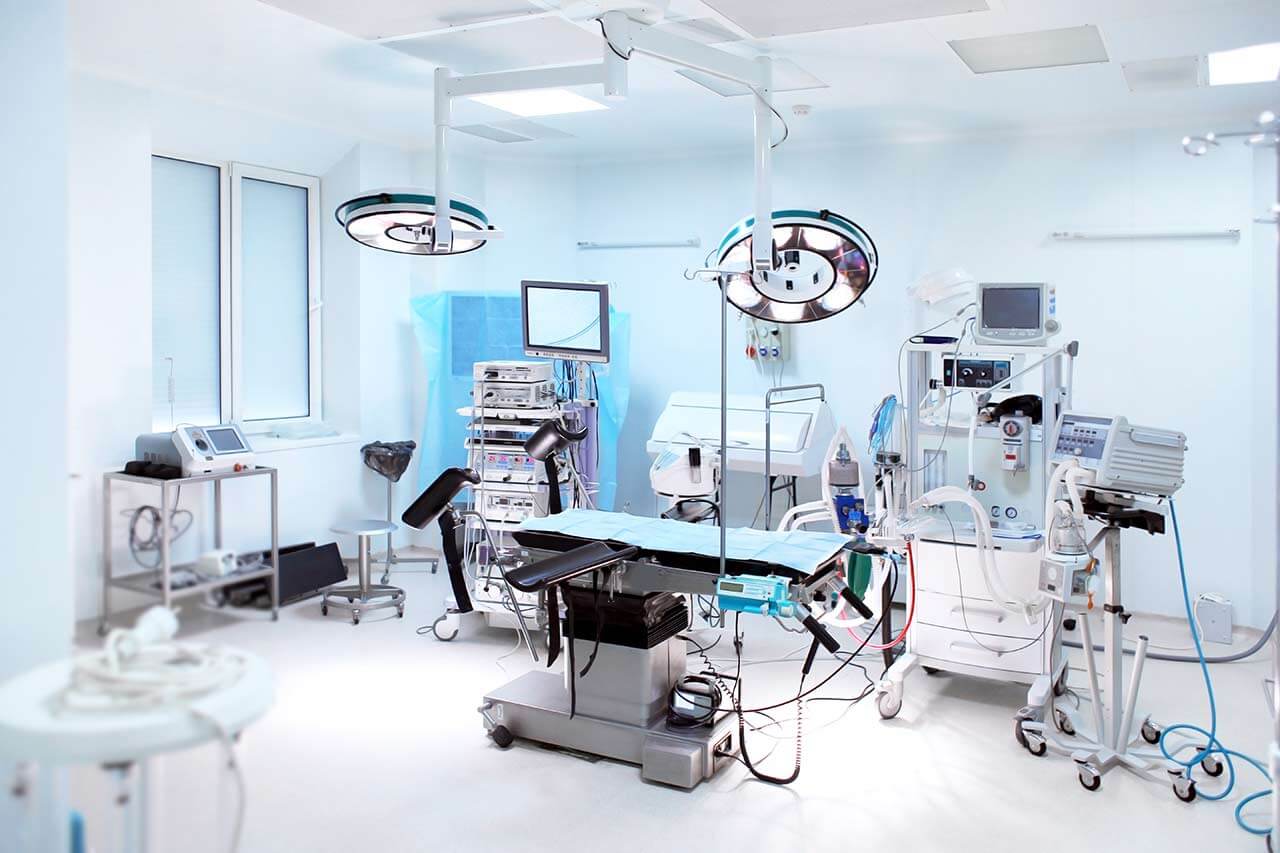
The program includes:
- Initial presentation in the clinic
- clinical history taking
- review of medical records
- physical examination
- laboratory tests:
- complete blood count
- inflammation indicators (CRP, ESR)
- abdominal ultrasound
- MRI of the abdominal cavity (on indication 1200 €)
- nursing services
- consultation of related specialists
- consultation of the chief physician and all leading experts
- development of dividual treatment plan
- written statement
Required documents
- Medical records
- Abdominal ultrasound (if available)
- MRI/CT scan of the abdomen and pelvis (if available)
Service
You may also book:
 BookingHealth Price from:
BookingHealth Price from:
About the department
The Department of General, Abdominal, Thoracic and Transplant Surgery at the University Hospital Hiessen UKGM offers all the options of surgical treatment in its areas of specialization, including endocrine surgery and obesity surgery. Of particular interest is the treatment of cancer pathologies. The department is certified by the German Cancer Society as a Center Bowel, Pancreatic and Stomach Cancers. The surgical treatment is carried out by highly qualified surgeons who have a perfect command of both classic and advanced surgical techniques. Whenever possible, operations are performed using sparing minimally invasive techniques. The department is headed by Prof. Dr. med. Dr. h.c. Winfried Padberg.
The department employs a specialized medical team for endocrine surgery. The doctors of this focus deal with the surgical treatment of all diseases of the thyroid gland, parathyroid glands, thymus, adrenal glands and pancreas. Most endocrine surgical procedures are performed using minimally invasive techniques. For example, this applies to thyroid interventions. After such operations the patient has an inconspicuous scar 15-20 mm long on his neck. In addition, the offered service spectrum also includes a minimally invasive axillo-bilateral-breast approach (ABBA method), which does not leave scars on the neck.
Another department’s priority is transplant surgery. Surgical options include lung transplantation (unilateral and bilateral) and kidney transplantation. The main indications for lung transplantation are chronic obstructive pulmonary disease (COPD), pulmonary fibrosis and cystic fibrosis. Lung transplantation has been performed in the department since 1999. Currently, the surgeons of the department perform about 15 such operations annually. The intervention is performed using thoracotomy (incision of the chest wall), without connecting the patient to the heart-lung machine. Kidney transplantation is performed in chronic kidney failure. Such operations have been performed in the department since 1993. During this time the department has performed more than 500 kidney transplants. The department is the leader in the Federal State of Hesse in the number of operations performed, the percentage of survival after transplantation, as well as in the number of kidney transplants from a living donor.
The specialists in the field of abdominal surgery are responsible for the surgical treatment of patients with diseases of the entire digestive tract (esophagus, stomach, small and large intestine, rectum, liver and pancreas). In addition, the surgeons specialize in the treatment of inguinal and umbilical hernias. With appropriate indications, minimally invasive operations are performed. The spectrum is also complemented by surgical interventions through the natural orifices of the body – natural orifice transluminal endoscopic surgery (NOTES).
It is worth noting that the department includes the Center for Hyperthermic Intraperitoneal Chemotherapy (HIPEC). The doctors of the center treat peritoneal carcinomatosis. The combination of hyperthermic intraperitoneal chemotherapy with surgical treatment can also be used for colorectal cancer, abdominal pseudomyxoma, mesothelioma, gastric cancer and ovarian cancer. The decision on this type of treatment is made at interdisciplinary tumor boards with the participation of surgeons, therapists, oncologists and other experts.
The department’s range of surgical services includes:
- Bariatric surgery (surgical treatment of morbid obesity)
- Sleeve gastroplasty
- Gastric bypass surgery
- Gastric banding
- Endocrine surgery
- Thyroid surgery
- Parathyroid surgery
- Thymus surgery
- Adrenal surgery
- Pancreatic surgery
- Diagnostic and therapeutic endoscopic procedures (as part of the multidisciplinary Center for Endoscopy)
- Diagnostics
- Esophagogastroduodenoscopy
- Chromoendoscopy
- Ileocolonoscopy
- ZOOM endoscopy
- Chromoendoscopy
- Video capsule endoscopy
- Capsule endoscopic examination of the small intestine
- Balloon enteroscopy
- Diagnostic examination of the small intestine
- Biopsy, polyp removal
- Hemostatic interventions
- Endosonography of the upper and lower gastrointestinal tract, including endosonography-guided biopsy and drainage
- Rectoscopy and proctoscopy, including hemorrhoids treatment
- Esophagogastroduodenoscopy
- Therapy
- Endoscopic hemostasis
- Clipping
- Latex ligation
- Injection therapy
- Fibrin glue therapy
- Thermal techniques
- Endoscopic resection
- Polypectomy
- Endoscopic mucosal resection
- Endoscopic submucosal dissection
- Endoscopic papillectomy
- Recanalization procedures
- Bougieurage
- Balloon dilatation
- Stent implantation (self-expanding polymer and metal stents, bioresorbable stents)
- Thermal methods (argon plasma coagulation, thermal probe)
- Closure procedures
- Endoluminal vacuum therapy
- Stenting
- Therapeutic endoscopic retrograde cholangiopancreatography
- Papillotomy, bougienage, lithotripsy
- Pancreatic duct dilatation, stone removal, cyst drainage, pancreatic necrectomy
- Bile duct and pancreatic stenting
- Special procedures
- Diverticulectomy
- Implantation and removal of an intragastric balloon in obesity
- Foreign body removal from the upper and lower gastrointestinal tract
- Endoscopic hemostasis
- Diagnostics
- Thoracic surgery
- Surgical treatment of lung cancer
- Organ-preserving resections (for example, segmental resection)
- Radical dissection of the lymph nodes
- Minimally invasive surgical procedures (video-assisted thoracic surgery, video-assisted mediastinal lymphadenectomy)
- Extended resections for locally advanced tumors
- Operations as part of multimodal, as well as neoadjuvant therapy
- Lung metastasis surgery
- Sarcomas
- Germ cell tumors
- Colorectal cancer
- Kidney cancer
- Melanoma
- Surgical treatment of rare thoracic tumors
- Pleural mesothelioma (with intraoperative hyperthermic chemoperfusion)
- Thymus and other mediastinal tumors
- Thoracic tumors and breast cancer with chest wall infiltration
- Special thoracic surgery
- Interventions on the trachea and upper respiratory tract
- Interventional tracheobronchoscopy: recanalization, stent implantation, treatment of bleeding from the respiratory tract
- Minimally invasive thymus resection in myasthenia gravis
- Minimally invasive diaphragm plication for symptomatic high standing of the diaphragm dome
- Minimally invasive removal of sympathetic nerve endings in hyperhidrosis
- Minimally invasive correction of pectus excavatum
- General thoracic surgery
- Minimally invasive surgery for pneumothorax
- Pleural empyema treatment
- Minimally invasive surgery for recurrent pleural and pericardial effusions
- Mediastinoscopic and thoracoscopic diagnostics, for example, to detect enlarged hilar lymph nodes, interstitial lung changes, pleural effusion
- Surgical treatment of lung cancer
- Transplant surgery
- Kidney transplantation
- Lung transplantation
- Cancer surgery
- Thyroid cancer
- Lung cancer
- Esophageal carcinoma
- Stomach cancer
- Liver cancer (metastases, primary liver tumors)
- Biliary tract, pancreatic cancer
- Colorectal cancer
- Retroperitoneal tumors
- Soft tissue cancer
- Skin cancer (malignant melanoma)
- Coloproctology
- Chronic inflammatory bowel disease
- Crohn's disease
- Ulcerative colitis
- Hemorrhoids
- Anal fistulas
- Anal abscesses
- Constipation
- Anal incontinence
- Abdominal surgery
- Gastric surgery
- Peptic ulcer interventions
- Reconstructive interventions
- Operations on the gallbladder and bile ducts
- Cholecystectomy
- Choledochotomy
- Biliary-digestive anastomoses
- Liver surgery
- Hemangioma removal
- Treatment of focal nodular hyperplasia
- Adenoma removal
- Liver cyst removal
- Hepatocellular carcinoma surgery
- Cholangiocellular carcinoma surgery
- Metastasis surgery
- Thermal ablation
- Pancreatic surgery
- Treatment of acute hemorrhagic necrotic pancreatitis
- Drainage surgery for chronic pancreatitis
- Pancreatic pseudocyst drainage
- Small and large intestine surgery
- Surgery for intestinal obstruction
- Adhesiolysis
- Appendectomy
- Peritonitis treatment
- Catheter placement for permanent ambulatory peritoneal dialysis
- Hernia repair
- Incisional hernia
- Inguinal/femoral hernia
- Umbilical hernia
- Hydrocele
- Surgery for inflammatory bowel diseases (ulcerative colitis and Crohn's disease)
- Gastric surgery
- Hyperthermic Intraperitoneal chemotherapy (HIPEC)
- Other medical services
Curriculum vitae
- 10.1973 - 05.1980 Study of Human Medicine at the University of Bonn. One-year practice at the Maltese Clinic of Bonn, optional subject: Gynecology and Obstetrics.
- 25.07.1979 American exam ECFMG (Educational Commission for Foreign Medical Graduates).
- 02.05.1980 Admission to medical practice.
- 12.12.1980 Doctoral thesis defense, Department of Ophthalmology, University Hospital Bonn. Subject: "Eyes and age – the study of monocular excursions, the width of the fusion and the fusion ability with aniseikonia in 70 subjects of all age groups".
- 01.07.1980 - 30.06.1981 Residency at Ravenswood Hospital Medical Center, University of Illinois, Chicago.
- 18.06.1981 American Exam FLEX (Federal Licensing Exam) in Chicago.
- 01.10.1981 - 31.12.1984 Start of specialized medical training at the Center for Surgery, Anesthesiology and Urology, Department of General and Thoracic Surgery at the University Hospital Giessen. Exchange work, Department of Cardiothoracic Surgery and Department of Traumatology.
- 09.09.1982 American exam VQE (Visa Qualifying Examination).
- 01.01.1985 - 31.12.1986 A two-year scholarship from the German Research Foundation as a Research Fellow in surgery at the Surgical Research Lab of Harvard Medical School and at the Brigham Women's Hospital at Harvard University, Boston.
- Since 01.01.1987 Research Fellow at the Surgery Center, Department of General and Thoracic Surgery, University Hospital Giessen. Continuing professional medical training with rotation in the Department of Urology (4 months) and the Department of Neurosurgery (1 month).
- Since 01.04.1989 Senior Physician of the Department of General and Thoracic Surgery.
- Since 01.07.1989 Head of the Laboratory of Transplant Immunology at the Department of Surgery.
- 29.09.1989 Ludwig Rhen Award from the Association of Surgeons of the Middle Rhine in Zurich for the work: "Immunological tolerance in organ transplantation".
- 01.10.1989 Start of a Research Project under the auspices of the German Research Foundation and with its material support on the subject: "Development of immunological tolerance in different immunosuppressive models".
- 06.12.1989 Board certification in Surgery.
- 06.12.1989 Habilitation in Surgery. Subject: "Acquired antigen-specific immunological tolerance in organ transplantation: efficacy and mechanism of action, as well as immunosuppressive synergism when using Cyclosporin A and antibodies to interleukin-2 receptors".
- 01.02.1991 PD title with a lecture on the occasion of taking up a post on the subject: "Development and current status of kidney transplantation".
- 10.05.1991 Walter Brendel Prize of the European Society for Surgical Research (ESSR) in Salzburg for the work: "Immunosuppression with low doses of cyclosporin A in rat bone marrow allotransplantation".
- 06.12.1991 Schunk Prize in Medicine, Department of Medicine, Justus Liebig university Giessen for work in the field of "immunological activation" and for "new methods of immunosuppression after transplantation".
- Since 01.03.1991 Second Senior Physician of the Department of General and Thoracic Surgery.
- Since 01.07.1992 Leading Senior Physician in charge of transplant medicine and personal issues.
- Since 04.1994 Board Member of the Faculty of Medicine and Member of the Committee on Educational Work.
- 03.11.1994 Admission to the list of candidates for the post of C4 Professor in General Surgery at Ernst Moritz Arndt University of Greifswald.
- 22.04. - 31.06.1996 Internship at the Humboldt University of Berlin at the Faculty of Medicine of the Virchow Hospital, Department of General, Abdominal and Transplant Surgery.
- 25.04.1996 Specialization in the field of Abdominal and Thoracic Surgery.
- 16.09.1996 Extraordinary Professorship.
- 01.05.1998 Leading Senior Physician in the Department of General and Thoracic Surgery.
- 28.09. - 10.10.1998 Internship at the University Hospital Vienna, Department of Cardiothoracic Surgery.
- 01.10.1999 Permission to conduct advanced training courses in Thoracic Surgery.
- 28.02. - 03.03.2000 Internship at the University Hospital Bern, Department of General, Abdominal and Transplant Surgery.
- 01.04.2000 - 28.02.2003 Head of the Department of General, Abdominal, Thoracic and Pediatric Surgery, Hospital in Steinenberg, Academic Hospital of the University of Tuebingen.
- Since 0.03.2003 Head of the Department of General, Abdominal, Thoracic and Transplant Surgery at the University Hospital Giessen UKGM.
Photo of the doctor: (c) UKGM - Universitätsklinikum Gießen und Marburg GmbH
About hospital
The University Hospital Giessen UKGM positions itself as an ultramodern medical facility with outstanding quality of medical care. The hospital presents almost all areas of medicine, ranging from ophthalmology to traumatology and dentistry. The priorities of the hospital’s activities include surgery, neurosurgery, oncology, nephrology with kidney transplantation and pediatric medicine.
The hospital is the third largest in Germany. Every year, more than 436,000 patients are treated in two locations of the hospital (Giessen and Marburg): 342,000 outpatients and 94,000 inpatients. The medical facility is the first privatized university hospital in the country.
The hospital staff is engaged not only in clinical practice, but also in research activities on the basis of the Faculty of Medicine at Justus Liebig University Giessen and Philipps University of Marburg, which contributes to a significant contribution to the development of modern medicine. During the many years of productive work on the development of new diagnostic and treatment methods, the hospital’s doctors managed to make many significant discoveries.
The hospital enjoys an excellent reputation in Germany and far beyond its borders. It managed to gain such credibility thanks to the high competence of doctors, advanced equipment, high-quality medical service and care.
Photo: (c) depositphotos
Accommodation in hospital
Patients rooms
The patients of the University Hospital Giessen UKGM live in comfortable rooms made in a modern design and light colors. Each room has an ensuite bathroom with shower and toilet. The standard room furnishing includes an automatically adjustable bed, a bedside table, a wardrobe, a table and chairs for receiving visitors, a TV, a telephone.
Meals and Menus
The patients of the hospital are offered balanced, healthy three meals a day: buffet breakfast, lunch and dinner. The private kitchen, certified according to DIN EN ISO 9001:2000, is responsible for providing patients with food and drinks.
If for some reason you do not eat all foods, you will be offered an individual menu. The hospital also has a cafeteria with a large assortment of hot and cold drinks, snacks and desserts.
Further details
Standard rooms include:
Television
All patient rooms are equipped with TV sets. If you have some questions, please contact medical personnel.
Religion
Religious services can be provided upon request.
Accompanying person
During an inpatient program, an accompanying person can stay with you in a patient room or in a hotel of your choice.
Hotel
During the outpatient program, you can stay at the hotel of your choice. Our managers will help you to choose the most suitable option.




